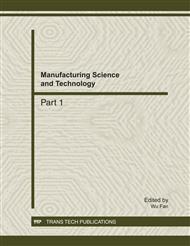[1]
M. Paolucci, and R. Sacile, Agent-Based Manufacturing and Control Systems, CRC Press, Boca Raton, London, New York, Washington, D.C., (2005).
Google Scholar
[2]
M.E. Aydin, and T.C. Fogarty, Simulated annealing with evolutionary processes in job shop scheduling, in Evolutionary Methods for Design, Optimization and Control, Proc. of Eurogen 2001, Athenes 2001, CIMNE, Barcelona (2002).
Google Scholar
[3]
H. Brasel, T. Tautenhahn, and F. Werner, Constructive Heuristic Algorithms for the Open-Shop Problem, Computing, vol. 51, 1993, pp.95-110.
DOI: 10.1007/bf02243845
Google Scholar
[4]
H. Brasel, A. Herms, M. Morig, T. Tautenhahn, J. Tusch, and F. Werner, Heuristic Algorithms for Open Shop scheduling to Minimize Mean Flow Time, Part I: Constructive Algorithms, www. Math. Uni-magdeburg. de/~werner/preprints/pp.06-48. pdf.
DOI: 10.1016/j.ejor.2007.02.057
Google Scholar
[5]
U. Dorndorf, E. Pesch, and T. Phan-Huy, Solving the Open Shop Scheduling Problem, Journal of Scheduling, vol. 4, 2001, pp.157-174.
DOI: 10.1002/jos.73
Google Scholar
[6]
H. -L. Fang, P. Ross, and D. Corne, A Promising Hybrid GA/Heuristic Approach for Open Shop Scheduling Problems, Proc. of the 11th European Conference on Artificial Intelligence, John Wiley and Sons, 1994, pp.590-594.
Google Scholar
[7]
P. Fattahi, A hybrid Multi Objective Algorithm for Flexible Job Shop Scheduling, Proc. of World Academy of Science, Engineering and Technology, vol. 38, 2009, pp.555-560.
Google Scholar
[8]
C. Gueret, and C. Prins, Classical and New Heuristics for the Open-Shop Problems: A Computational Evaluation, European Journal Operation Research, 107, 1998, pp.306-314.
DOI: 10.1016/s0377-2217(97)00332-9
Google Scholar
[9]
N. Imanipour, and S.H. Zegordi, A heuristic Approach Based on Tabu Search for Early/Tardy Flexible Job Shop Problems, Scientia Iranica, vol. 13, N 1, 2006, pp.1-13.
Google Scholar
[10]
K. Jansen, M. Mastrolilli, and R. Solis-Oba, Approximation algorithms for flexible job shop problems, Proc. of Latin American Theoretical Informatics, LNCS 1776, 2000, pp.68-77.
DOI: 10.1007/10719839_7
Google Scholar
[11]
Y. K. Kim, K. Park, and J. Ko, Symbiotic evolutionary algorithm for the integration of process planning and job shop scheduling, Computers & Operations Research, 30, 2003, pp.1151-1171.
DOI: 10.1016/s0305-0548(02)00063-1
Google Scholar
[12]
G.J. Kyparisis, and C. Koulamas, Open Shop Scheduling with Makespan and Total Completion Time Criteria, Comput. Operations Research, vol. 27, 2000, pp.15-27.
DOI: 10.1016/s0305-0548(99)00005-2
Google Scholar
[13]
C.F. Liaw, Iterative Improvement Approach for the Nonpreemptive Open Shop Scheduling Problem, European Journal Operations Research, vol. 111, 1998, pp.509-517.
DOI: 10.1016/s0377-2217(97)00366-4
Google Scholar
[14]
C.F. Liaw, A hybrid genetic Algorithm for the open shop scheduling problem, European Journal Operation Research, vol. 124, 2000, pp.28-42.
DOI: 10.1016/s0377-2217(99)00168-x
Google Scholar
[15]
T., Satake, K. Morikawa, K. Takahashi, and N. Nakamura, Simulated annealing approach tor minimising the makespan of the general job-shop, International Journal of Production Economics, 60-61, 1999, pp.515-522.
DOI: 10.1016/s0925-5273(98)00171-6
Google Scholar
[16]
D.Y. Sha, and Ch. - Yu Hsu, A new particle swarm optimization for the open shop scheduling problem, Computers and Operations Research, vol. 35, issue 10, October 2008, pp.3243-3261.
DOI: 10.1016/j.cor.2007.02.019
Google Scholar
[17]
L. Sakalauskas, G. Felinskas, Optimization of Resource-Constrained Project Schedules by Simulated Annealing and Variable Neighborhood Search, Technological and Economic Development of Economy, vol. 12, N 4, 2006, pp.307-313.
DOI: 10.3846/13928619.2006.9637759
Google Scholar
[18]
K. Steinhofel, A. Albrecht, C.K. Wong, Fast parallel heuristics for the job shop, scheduling problem, Computer & Operations Research, 29, 2002, pp.151-169.
DOI: 10.1016/s0305-0548(00)00063-0
Google Scholar
[19]
M. Yazdani, M. Gholami, M, Zandieh, and M. Mousakhani, A Simulated Annealing Algorithm for Flexible Job Shop Scheduling Problem, Journal of Applied Sciences, 2009, pp.1-9.
DOI: 10.3923/jas.2009.662.670
Google Scholar
[20]
T. Gabel, and M. Riedmiller, On a Succesful Application of Multi-Agent Reinforcement Learning to Operations Research Benchmarks, Proc. of the 2007 IEEE Symposium on Approximate Dynamic Programming and Reinforcement Learning, pp.68-75.
DOI: 10.1109/adprl.2007.368171
Google Scholar
[21]
A. Kazemi, and M.H. F. Zarandi, An Agent Based Framework for Bulding Decision Support System in Supply Chain Management, Journal of Applied Sciences 8 (7), 2008, pp.1125-1137.
DOI: 10.3923/jas.2008.1125.1137
Google Scholar
[22]
J. Madejski, Agent architecture for intelligent manufacturing systems, Journal of Achievements in Materials and Manufacturing Engineering, vol. 29, issue 2, August 2008, pp.167-170.
Google Scholar
[23]
J. L. Pollock, Against Optimality: Logical Foundations For Decision - Theoretical Planning In Autonomous Agents, Computional Intelligence, vol. 22, N 1, 2006, pp.1-25.
DOI: 10.1111/j.1467-8640.2006.00271.x
Google Scholar
[24]
V. Thiagarasu, and T. Devi, Multi-Agent Coordination in Project Scheduling: Priority Rules Based Resource Allocation, International Journal of Recent Trends in Engineering, vol. 1, No 2, May 2009, pp.42-46.
Google Scholar
[25]
Z. Wang, X. Li, and X. Qi, The Design and Devolopment of a Multiagent Agile Scheduling System, International Journal of Computational Intelligence Research, vol. 4, N 1, 2008, pp.45-52.
Google Scholar
[26]
I. Badr, An Agent-Based Scheduling Frameqork for Flexible Manufacturing Systems, Proc. of World Academy of Science, Engineering and Technology, vol. 30, July 2008, pp.363-369.
Google Scholar
[27]
W. Shen, and D.H. Norie, Agent-Based Systems for Intelligent Manufacturing: A Stste-of-the-Art Survey, Knowlegde and information Systems, an International Journal, vol. 1, N 2, 1999, pp.129-156.
Google Scholar
[28]
W. Shen, Distributed manufacturing scheduling using intelligent agents, IEEE Intelligent Systems, January/ February, 88, (2002).
DOI: 10.1109/5254.988492
Google Scholar
[29]
T. Witkowski, P. Antczak, and A. Antczak, Application of GRASP procedure for production scheduling and its comparision with other methods, Journal of Automation and Information Sciences, Beggel House Inc., New York 2005, vol. 37, 6(40), pp.35-40.
Google Scholar
[30]
T. Witkowski, P. Antczak, and A. Antczak, The application of simulated annealing procedure for the flexible job shop scheduling problem, Proc. 11th International Conferene Information Processing and Management of Uncertainty in Knowledge-Based Systems (Industrial Track), Paris 2006, pp.21-26.
DOI: 10.1109/aici.2010.212
Google Scholar


